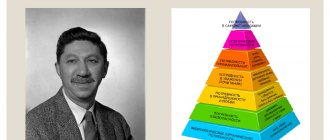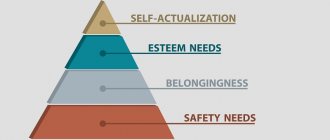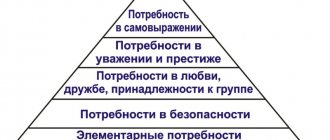Characteristics of a self-actualizing person
Based on his observations, Maslow identified a number of characteristics of self-actualizing people.
Effective perception of reality
Self-actualizing people have “an unusual ability to recognize falsehood, insincerity, and deceit in personality and generally to judge people correctly and effectively” (Maslow, 1954/1987). Unlike other people, they are not prone to being deceived by their own defense mechanisms, desires, expectations or stereotypes. Rather, like the boy in the fairy tale, they will see that the king is naked, if this is indeed the case. Perhaps this vigilance develops because they are not intimidated by the unknown and their focus is not narrowed by vain demands (Maslow, 1955).
Adoption
Maslow's self-actualizing subjects were more accepting of themselves, others, and nature than the average person accepts, including acceptance of their “animal level”; they eat well, sleep well and enjoy sex. They accept both good and bad, thus being tolerant. Research suggests that self-actualizing people (as reflected by a low discrepancy between the self and the ideal self) have less fear of death (Neimeyer, 1985a).
Self-actualizing people behave spontaneously, simply and naturally, although outwardly, as a rule, they do not stand out. This spontaneity stems from close contact with inner impulses and subjective experiences. They don't hide behind a social mask. Research finds that self-actualization (as measured by the Personality Orientation Questionnaire) is positively correlated with impulsivity among older women, but this is not found among men (Plouffe & Gravelie, 1989).
Problem-centered
Self-actualizing people focus on external problems. They are problem-centered, not self-centered. Challenges may stem from a sense of public duty.
Need for privacy (solitude)
Self-actualizing people enjoy solitude more than most people. Maslow suggested that they tolerate sensory deprivation (carried out by experimental psychologists) more easily than other people. They are capable of deep concentration and live by their own mind, not allowing others to make decisions for them.
Independence from culture and environment (autonomy)
Self-actualizing people do not depend on other people or the world around them to meet their needs. They are “self-sufficient” and cheerful in the face of difficulties. Because the self-actualizing person is motivated by internal needs instead of reacting to external influences, he experiences greater “psychological freedom” (Maslow, 1968b).
Freshness of the assessment
In self-actualizing individuals there is always a feeling of reverent surprise before life. It may be caused by aesthetic experiences, social encounters or other reasons. For many of Maslow's subjects, sexual pleasure was provided by "that vitality and renewal which some people derive from music or nature" (Maslow, 1954/1987).
Summit experiences
Perhaps the most famous characteristic described by Maslow is the capacity for mystical experiences, which he called pinnacle experiences. Maslow (1954/1987) described them as
feelings of endless horizons open to view; simultaneously feeling more powerful and more helpless than ever before; a feeling of great ecstasy and wonder and awe; the loss of place in time and space, finally combined with the conviction that something extremely important and valuable has happened, so that such experiences, even in ordinary life, transform and strengthen the subject.
Such experiences can be generated by many events. Sometimes they arise as a reaction to nature; sometimes have a religious character; sometimes they occur during meditation, and sometimes even accompany sexual intimacy. However, not all self-actualizing people “conquer the peaks” - the latter falls to the lot of people of a poetic, musical, philosophical and religious nature. The heights are inaccessible to more practical individuals engaged in the social world in the sphere of reforms, politics and other earthly areas. Everything suggests that Maslow admired the conquerors of peaks, whom he called “transcendents,” more than those who were not among them, calling such people “simply healthy.”
People often do not report their peak experiences because they are so personal (Davis, Lockwood, & Wright, 1991). Gail Privette (1983, 1985, 1986) writes that reports of summit experiences are characterized by a distinct expression of “joy, perfection, and lasting significance... and for some, spiritual... clarity of a process characterized by focus, meaning, a sense of self, freedom, and spontaneity" (Privette, 1986). Although the peak experience itself is transitory, it often has a lasting effect that can even turn one's entire life upside down (Lanier et al., 1996).
Self-reported peak experiences are correlated with susceptibility to hypnosis and romantic love (Mathes, 1982). Additional research into altered states of consciousness as they relate to mental health could provide answers to these unresolved questions. Students, artists, and real estate agents, regardless of age or life transition, describe peak experiences in the same words (Lanier et al., 1996; Yeagle, Privette, & Dunham, 1989). Are these pinnacle experiences simply the result of doing something perfectly? No. The way subjects describe pinnacle experiences differs from their self-reported pinnacle achievements, in which they did an excellent job (Privette & Bundrick, 1987). These attempts to quantify subjective experiences are laudable, but it is unclear whether Maslow's peak experiences correspond to these subjective experiences or to descriptions based on interpersonal communication (Gordon, 1985) or to the experiences of yogic ashram residents (Wilson & Spencer, 1990). ).
Maslow did not say that peak experiences occur only in self-actualizing individuals, but he did argue that they are more common among such individuals (Daniels, 1982; Maslow, 1968b, 1969). In his later theorizing, Maslow recognized that some people experience apex experiences in childhood, when they may not yet be self-actualizing, as evidenced by retrospective reports from adults (Hoffman, 1998). Stamatelos (1984) reports that even the mentally retarded can experience summit experiences. Perhaps such episodes should be classified as exceptions, which Maslow mentioned when he noted that not all apex experiences are genuine “awareness of being,” that is, evidence of self-actualization (Maslow, 1968b). While there is justification for the view that some people stuck at lower levels of development must be too rigid to allow themselves to experience the altered states that Maslow described as peak experiences, there is no evidence that these experiences are unique to self-actualizing people.
Human kinship
Self-actualizing people identify with human beings in general, experiencing a sense of kinship with the human race. They are free from bias because they identify with all people rather than with any particular group.
Modesty and respect
Self-actualizing people are humble and feel that they can learn a lot from other people, even from people of a different class or race. They are not authoritarian, democratic and do not insist on maintaining their superior position.
Interpersonal relationships
Self-actualizing people are capable of “more unity, more love, more perfect identification, more blurring of ego boundaries than other people would consider possible” (Maslow, 1954/1987). However, they make distinctions by looking for other self-actualizing people, and therefore maintain close relationships with only a few, avoiding broader but superficial connections. They also attract admirers who may be absolutely devoted to them and even become disciples, although self-actualized people do not encourage this worship.
Ethics and values
Self-actualizing people have strong ethical standards, although the latter are often not the usual standards of truth and falsehood. They are not concerned with what Maslow (1954/1987) saw as trivial ethical issues—for example, “playing cards, dancing, short skirts, exposing the head (in some temples) or keeping it covered (in others), drinking wine or eating the meat of some animals, but not other animals, or eating it only on certain days.” Their values grow from accepting humanity in general and their own nature, including their own unique potential.
Distinguishing between ends and means
Maslow's subjects were clearly focused on the ends of their efforts and subordinated the means to those ends. Nevertheless, they could appreciate the pleasure brought by the means.
Sense of humor
Self-actualizing individuals have a harmless sense of humor and do not make fun of people. Their sense of humor is more philosophical than that of most people; it concerns the human condition. Overall though, Maslow's subjects were more serious than humorous.
Creativity
Creativity is the only characteristic that, according to Maslow, was inherent in all of his self-actualizing subjects, without exception. He understood creativity not in the sense in which we often understand it. It does not necessarily require any creative product such as art or music—what Maslow (1954/1987) calls “creativity.” associated with a special talent" as opposed to "self-actualizing creativity." “There may be creative shoemakers, or carpenters, or clerks. Creativity can be seen even in a child.”
Although Maslow's creativity does not require expression in the traditional arts, for many people the latter can stimulate such creativity and self-actualization. For example, one study suggests that artistic activity stimulates self-acceptance and openness, two important aspects of self-actualization (Manheim, 1998). Researchers have reported correlations between measures of self-actualization and creativity, including assessed creativity in writing and art projects (Buckmaster & Davis, 1985) and creativity measured in a writing test (Runco, Ebersole, & Mia, 1991). The creativity of a self-actualized person naturally develops from other characteristics: spontaneity, resistance to cultivation, efficiency of perception, etc. This ability is characteristic of all children, but is lost in many as early creativity is replaced by neuroses and what psychoanalysts call the secondary process (Maslow , 1958).
Resistance to "cultivation"
Self-actualizing people do not “adapt” to society at the expense of their own character, but “maintain a certain inner distance (and culture) in which they are immersed” (Maslow, 1954/1987). They are traditional when it is easier or less disruptive, but this is a superficial adaptation , which readily gives way to their autonomous nature. In other cases, they are not so easily influenced. On an inference test, students who demonstrated high self-actualization scores were less influenced by statements that led them to evaluate their actions as weak or successful than those who were not as self-actualized (Bordages, 1989).
Resolving dichotomies
Self-actualizing people do not think in terms of either/or, as less healthy people often do. Maslow (1954/1987) offered several examples of dichotomies that no longer seem so to self-actualizing people, such as reason-emotion, selfish-unselfish, seriously funny, and masculine-feminine. Rather than seeing a conflict between what is good for the individual and what serves society, they see both as working together, “synergistically” (Maslow, 1964). This fusion of personal and social interests can also arise at the cultural level, leading to a better social order, a utopia, or, to use Maslow's preferred term, Eupsyche. By consciously thinking and acting in a spirit of synergy, highly developed people can help resolve some of the social problems caused by less developed, dichotomous thinking (Carlsen, 1996).
Although his subjects had so many admirable qualities, Maslow (1954/1987) did not consider them perfect.
They also tend to have stupid, wasteful, or thoughtless habits. They can be boring, stubborn, annoying. They are in no way free from very superficial vanity, pride, partiality towards their creations, family, friends and children. Loss of self-control is not uncommon.
And because of their autonomy, they are “occasionally capable of extraordinary and unexpected ruthlessness”—for example, ending a friendship or marriage, or recovering quickly (too quickly, most people would say) from the death of a loved one.
Maslow's list of characteristics of self-actualizing people serves as a description of mental health; of what people will become if they realize their full potential. Willard Mittelman (1991) interpreted these characteristics as a consequence of an “open” personality, meaning that such a person does not resort to defense when absorbing information and experiences.
Reflection of Maslow's pyramid on Business
Now let's talk about how this whole pyramid affects business. If you look closely, you will see that business only starts at level 4. At this stage, the desire to win, the desire to stand out, to be different from everyone else, to be better than others, the desire to prove that you deserve more comes first. All this is fraught with risks, but real entrepreneurs are not afraid of risks, because if you don’t play, you will never win. They are motivated to win.
For this reason, people who have already fulfilled their basic needs come into business, people who understand the rules of the game and accept them. In case of defeat, they are able to rise and move on.
What happens when a person who has not reached level 4 gets into business? Some of them want to earn a piece of bread and butter, some are looking for stable income, which they lost in their regular jobs during the crisis, some people start a business because it’s fashionable.
Obviously, the expectations of such people will not be met, since they are not ready to accept the rules of the game based on the principle of victory or defeat. Stability, comfort, and security do not exist in business. There is no collectivism either, since the owner of the business is not one of his employees, much less his competitors.
The topic of this article clearly has a continuation and, in the future, I will try to return to this issue, but now, as a summary, I would say the following.
Business is not a way to quench hunger and thirst, nor is it a way to gain stability. Business is an opportunity to realize yourself, to get something greater than everyone else, to get adrenaline from risk and a thrill from the results achieved. Of course, it can satisfy the needs of levels 1 and 2, but this is more of a side effect.
Measuring and Researching Self-Actualization
Maslow did not try very hard to develop measurement tools, preferring mainly to make more holistic observations of people in accordance with his concept of the receptive, or Taoist, scientific method. However, he collaborated with his wife in developing the Maslow Art Test "to test holistic perception and intuition by testing the ability to identify an artist's style" (Maslow, 1966). This ability, which can perhaps be described as an intuitive cognitive style, is not necessarily enhanced by training in the arts and may sometimes even be weakened by it. Maslow valued the receptive ability the test measured and believed that it, combined with the ability to think in the abstract, nomothetic concepts of traditional science, might allow psychologists to develop the new approach he envisioned.
Maslow (1968b) was aware that his ideas were in the early stages of scientific validation. He admitted that his writings “are full of statements that are based on pilot studies, fragmentary evidence, personal observation, theoretical deduction and naked intuition ... These are hypotheses, that is, what is subject to verification, and not the ultimate truth.” Other scientists have reinforced these ideas as the next logical step. A key concept in Maslow's theory is self-actualization. While Maslow explored this construct through observation rather than formal measurement, others have attempted to assess self-actualization using a questionnaire.
Stages
Self-actualization in psychology is an individual intention to discover talents and understand one’s own purpose, therefore there are no universal stages in this process. Psychologists advise to independently, or with the support of a specialist, determine a plan of action based on personal capabilities and desires.
Usually, in order to do this as effectively as possible, it is advised to spend some time planning the stages, meditate, brainstorm, and only then evaluate potential opportunities. The stages of self-actualization do not have clear distinctions, and the only criterion leading a person to development will be his intuition.
Personality Orientation Questionnaire
The Personality Orientation Inventory (POI) (Shostrom, 1964) is a 150-item alternative choice questionnaire that contains two major scales derived from Maslow's theory. Self-Focus scale measures the degree to which a subject provides support for himself (as opposed to other-directedness).
Time Competence Scale refers to the degree to which the subject lives in the present. In addition, there are subscales measuring the values of self-actualization, existentiality, emotional reactivity, spontaneity, self-concern, self-acceptance, nature of people, synergy, acceptance of aggression, and capacity for close relationships.
Everett Shostrom (1964) described that his questionnaire distinguished between groups recognized by clinicians as self-actualizing and non-self-actualizing, and that significant changes in the total scores occurred over the course of psychotherapy. In a number of studies, POI has received support through a pivotal group study: groups considered more self-actualizing showed higher scores than those considered less self-actualizing. For example, the scores of therapeutic patients were higher than those of alcoholics, whose scores were higher than those of schizophrenics (Murphy, DeWolfe, & Mozdzierz, 1984). By synthesizing data from many studies conducted on different groups, the meta-analysis supports the prediction that groups perceived as more self-actualizing change according to POI survey results (Hattie Cooksey, 1984). Groups that were trained (counselors) or had experience in meeting groups generally scored higher than randomly selected adults, and mixed groups scored lower overall.
Researchers have often used the Personality Orientation Questionnaire as a key measure of mental health. Rates increase as a result of therapeutic interventions, including client-centered training groups for student counselors (Elizabeth, 1983); studying Gestalt therapy on a full-time basis as opposed to a compressed summer course, which was not as successful (Peterson-CoQney, 1987); neurolinguistic programming training (Duncan, Konefal & Spechler, 1990); meditation (Delmonte, 184); psychological self-help literature (Forest, 1987); and exercise (Gondola & Tuckman, 1985). However, an increase in scores is not always found (Giltinan, 1990).
The Personality Orientation Inventory has been positively correlated with other measures of mental health, including the Endurance Test (Campbell, Amerikanei, Swank & Vincent, 1989), conceptual complexity (Hageseth & Schmidt, 82), creativity (Yonge, 1975), and self-confidence (Ramanaiah , Heerboth & Jinkerson, 1985). There is some evidence that self-actualization on the POI correlates with greater spirituality as measured by a written test (Tloczynski, Knoll, & Fitch, 1997). Those in married couples who score higher also report greater pleasure from sex (McCann & Biaggio, 1989). A short version of the Personal Orientation Inventory, consisting of only 15 items, has been developed (Jones & Crandall, 1986), as have other measures of self-actualization (e.g., Buckmaster & Davis, 1985; Sumerlin & Bundrick, 1996, 1998), but none They are not used as widely as POI.
Application in marketing
The activities of a marketer are aimed at satisfying the needs of their customers. It is not surprising that they tried to adapt Maslow's theory to their needs, although it clearly did not imply that. Marketing researchers have failed to apply the psychological concept to sales relationships and have been quick to declare it invalid, outdated, and absurd.
In fact, the theory of needs is sometimes used by teachers and psychologists in their activities. They say that Maslow's concept is aimed primarily at:
- People's awareness that in addition to satisfying physical needs, as well as entertainment purposes, they have the opportunity to develop their interests in other areas of life. Expand your horizons and the like.
- In a pedagogical sense, mastering a simple principle of how any learning is structured: until you explain the material, the rule of life using examples accessible to the child, you will not get stable results and awaken interest in something more sublime.
- Recognition that self-actualization is the highest value for a person, but it is not at all leading for the development of his personality.
Obstacles to self-actualization
If self-actualization is an innate potential, then why doesn't everyone develop it? Human beings are constantly faced with situations in which they must choose between growth and security. The choice of security calls to ourselves, but only the choice of growth brings us closer to self-actualization. If we think not about the dangers of growth, but about positive drives and the possibility of boredom instead of social approval of what appears to be a safe choice, then our choices will more often move us in the direction of self-actualization. To encourage children to make this choice, parents must have the wisdom to avoid both overprotection (which orients children toward safety) and overapproval (which focuses the child on others' opinions instead of their own experiences). When all goes well, the child discovers that choosing growth offers fun, while choosing security leads to boredom. In less than ideal circumstances, choosing growth seems dangerous, but choosing safety promises approval (Figure 2).
Choosing between security and growth. After Maslow, 1962
This postulate is supported by research that reports lower levels of self-report boredom vulnerability among students with high scores on the Brief Self-Actualization Index (McLeod & Vodanovich, 1991).
Besides this intrapsychic craving for self-actualization, there are other reasons why self-actualization is not common. Higher-order needs develop only when favorable external conditions (such as adequate food and shelter) allow earlier needs to be satisfied. In addition, higher order needs are weaker than lower order needs, so they have to compete with them.
External forces can overshadow our internal motivations more easily than the motivations of animals.
People have more instincts in the animal sense - powerful, unmistakable inner voices that unambiguously tell us what, when, where, how and with whom to do. All we have left are vestiges of instinct. And moreover: they are weak, subtle and elusive; they are very easily displaced by learning, cultural demands, fear, and disapproval (Maslow, 1968b).
To emphasize the weakness of human instincts, Maslow (Maslow, 1955,1965) provided them with the ending -oid, calling them instinctoids. The weakness of higher instinctoid impulses means that sometimes they turn out to be inadequate and do not lead us to full self-actualization.
In addition, people sometimes have a Jonah complex, which means they are convinced that they cannot do something very important and, thus, are prevented from realizing their full potential. Maslow (1976) reproached his students for their lack of desire to make important contributions to the development of their fields of activity. He asked them: “If not you, then who?” He warned that the failure of the aspiration to the highest potential, self-actualization, would leave them deeply unhappy.
Application of Maslow's pyramid in business management practice
The theory developed by A. Maslow is applicable not only to customers, but also to employees, because they also need motivation. “A satisfied worker is a productive worker,” says the axiom of successful production. And for an employee to be satisfied, it is necessary, first of all, to satisfy desires from the first two steps of the pyramid: physiology and safety.
Most managers believe that wages are the driving mechanism of the team, but this is not always true. In most cases, intangible values and desires are much more important to employees than increasing their work rate. In the end, only a few will want to work 20 hours a day without rest or lunch for double the salary. On the other hand, an employee who is provided with food and drink, proper rest, comfortable working conditions and has good connections with colleagues is motivated to work, and if at the same time he also has an established family life and has a three-room apartment in the suburbs, we get a satisfied, productive employee.
Therefore, if you want to assemble a team of productive workers who are motivated and focused on improving the quality of production, your initial task is to provide them with optimal working conditions, that is, satisfaction of the first three steps of Maslow's pyramid.
Basic postulates of the theory
Each step of the pyramid represents one level of needs. More pronounced needs are lower, and less pronounced needs are higher. Without satisfying (at least partially) basic needs, it is extremely difficult to move up the pyramid. Above we examined all the steps in detail. To list them briefly, they are physiology, safety, sociality, recognition and cognition. Alternative levels are curiosity and aesthetics. They play no less a role in motivating an individual’s behavior.
It has already been mentioned that physiology is the basic step of the pyramid. According to Maslow, a person should ideally reach his or her highest level by about age fifty.
Aesthetic need
It is not for nothing that Maslow himself attributes the need for beauty to the highest levels of the pyramid. It is not the main thing, without visiting a museum and admiring masterpieces of art, a person can easily live a long, happy and quite rich life, but there are cases when filling an aesthetic need is urgently necessary. First of all, this applies to people who have achieved certain heights and satisfied all other levels. They lack the fullness and colorfulness of life, therefore, they look for this beauty in their surroundings. Products from the higher levels of the pyramid are rarely in great demand and require searching for a specific caste of customers. It is quite logical that a factory worker from a remote village is unlikely to be interested in a Dali painting or Bradbury’s works, so 60% of the success of selling such a product will depend on the choice of a suitable consumer and only the remaining 40% on your approach.
How to apply the pyramid in different areas of life
Knowledge of Maslow's pyramid helps you build a career, resolve conflicts in the family, set priorities, and finally understand yourself. Let's look at a few examples.
Career
Most of us go to jobs we don't like every day and dream of changing something. Having read stories about successful people who gave up everything and started doing what they loved, some leave the office and try to engage in self-realization. For example, create your own blog. But some time passes, the blog does not generate income, and the money set aside “for a rainy day” runs out.
The person begins to get nervous and look for a way out of the situation. Then he has no time for creativity and self-realization. He has not fulfilled the basic needs of safety and satisfaction of hunger. It's better to do the following. Find a job that brings a stable income and gives you the opportunity to do what you love. If you understand that you can earn enough to satisfy basic needs, you can leave your unloved job.
Family
There are any number of situations in a family in which Maslow’s pyramid will help.
Partner
To create a family, it is important to choose the right partner. Based on Maslow's system, this is quite easy to do.
Choose according to your needs. Is it important for you to develop and travel? Look for someone with the same needs. Discuss views and priorities so that there are fewer disagreements later. Or it may turn out that you want to visit theaters, and your spouse will play online games all weekend.
Husband. Remember Russian folk tales? A good fellow comes to Baba Yaga. She pesters him with questions, and he asks first to feed him, give him something to drink, and put him to bed. It's like that in life too. When a person is very tired and stressed, he has no time to talk. First you need to have something to eat or take a short nap to regain your strength. Therefore, there is no point in starting a serious conversation with your husband if he comes home from work tired. This will not lead to anything good. Let the person rest a little.
Teenage child. For a teenager, such a need as belonging is important. They are socialized through belonging to a group, so they often fall into “bad company.” You need to think about this in advance and offer your child an alternative: play sports, become a volunteer, etc. The main thing is that he feels “in the pack.”
Purchases
How often do you buy things and services that you can do without? In our era of consumption, we spend money on things we don’t need at all, succumbing to advertising tricks. Advertisers put pressure on us using our needs. We buy a cool car, a house, a fur coat in order to be “no worse than others.”
This is a kind of social status, belonging to a group. But, think about it, maybe you can do without a new smartphone, or give up a cool trip and spend the weekend with your children. Analyze needs, set priorities.
Recognition and veneration
Having settled down in a comfortable home with his soulmate, a person begins to wonder what else is missing in life? The answer comes to the fourth step of the pyramid - the desire to establish itself. Even with a well-paid job, a person often feels inferior. The desire for honor and respect is natural in all areas of life: work, home, social connections
By using this need when communicating with a person, you can quickly attract his attention, inspire confidence and, therefore, persuade him to purchase the product.
To establish strong bonds of trust, it is important to choose people whose behavior reveals uncertainty and reticence.










